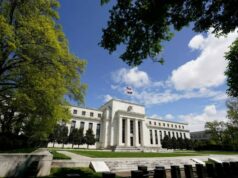Yields on government debt climb after Fed chair appointment, US jobs report
LOCAL DEBT YIELDS climbed last week due to developments in the US economy, namely the upbeat jobs data and the appointment of the new US central bank chief.
Yields on local government securities (GS) went up by 23.8 basis points (bps) on average week on week, data from the Philippine Dealing and Exchange (PDEx) as of Nov. 3 showed.
“GS yields rose [last] week due to the hawkish tone of the FOMC (Federal Open Market Committee) minutes and better-than-expected US ADP employment,” said Guian Angelo S. Dumalagan, market economist at the Land Bank of the Philippines (Landbank).
“Expectations of upbeat US non-farm payrolls also pushed yields higher,” he added.
The Federal Reserve kept interest rates unchanged on Wednesday and pointed to solid US economic growth and a strengthening labor market while playing down the impact of recent hurricanes, a sign it is on track to lift borrowing costs again in December.
“The labor market has continued to strengthen and … economic activity has been rising at a solid rate despite hurricane-related disruptions,” the Fed’s rate-setting committee said in a statement after its unanimous policy decision.
In keeping with that encouraging tone, the central bank’s policy makers acknowledged that inflation remained soft but did not downgrade their assessment of pricing expectations.
The Fed has raised interest rates twice this year in its efforts to normalize monetary policy. Markets expect a quarter-point hike in the Fed’s December meeting.
Meanwhile, non-farm payrolls increased by 261,000 last month as 106,000 leisure and hospitality workers returned to work, the US Labor Department said in its closely watched employment report on Friday. That was the largest gain since July 2016 but below economists’ expectations for a jump of 310,000 jobs.
Data for September was revised to show a gain of 18,000 jobs instead of a decline of 33,000 as previously reported.
A separate report showed private sector employment in the US climbed by 235,000 jobs against the 200,000 new jobs expected in October. The report noted significant growth in the professional services, particularly in the higher paid professional technical jobs, and those of small businesses which were said to have rebounded from the impact of Hurricanes Harvey and Irma.
For Ruben Carlo O. Asuncion, chief economist at the UnionBank of the Philippines (UnionBank), yield movements last week were influenced by “good corporate earnings results” as well as the “dovish signal brought about by Jerome Powell’s nomination as the next Federal Reserve chief.”
Set to take the reins of the US central bank in February, Mr. Powell has voiced approval to increasing interest rates given improvements in the US labor market.
On the domestic front, one bond trader noted that “the additional P50 billion borrowing of the [Bureau of the Treasury] weighed on sentiment as did concerns about domestic inflation reported [this] week and the possible move by the BSP (Bangko Sentral ng Pilipinas) on Thursday.”
In the secondary market, yields were up almost across the board. At the short end, rates of Treasury bills (T-bills) shot up, with yields on the 91-, 182- and 364-day T-bills increasing by 35.73 bps (2.4321%), 41.49 bps (2.9018%) and 17.27 bps. (3.0375%), respectively.
At the belly, the four-year Treasury bond (T-bond) rallied as yields fell 5.89 bps to 4.5732%. Meanwhile, the two-, three-, five- and seven-year papers fetched higher yields, increasing by 6.11 bps (4.0107%), 37.67 bps (4.1546%), 31.25 bps (4.7125%) and 7.54 bps (4.9375%), respectively.
At the long end of the yield curve, yields on the 10- and 20-year T-bonds went up 33.26 bps (5.1214%) and 33.59 bps (5.4804%), respectively.
Looking forward, analysts expect yields to trade with an upward bias given a slew of reports coming in.
UnionBank’s Mr. Asuncion said: “[This] week’s trading might continue on the upside as the ASEAN (Association of Southeast Asian Nations) Summit signals positivity for the Philippines and the region in general. It is also expected that investors will be active, awaiting the passage of the first package of administration’s tax reform.”
For Landbank’s Mr. Dumalagan, yields “might move sideways with an upward bias as economic reports and events… are expected to be aligned with expectations.”
Noel S. Reyes, chief investment officer for asset management at Security Bank Corp., likewise expects yields “to be higher until next week.”
“Tax cuts may create higher inflation and we usually follow US movements so [local] trends should be higher,” he said. – Minde Nyl R. Dela Cruz with Reuters



